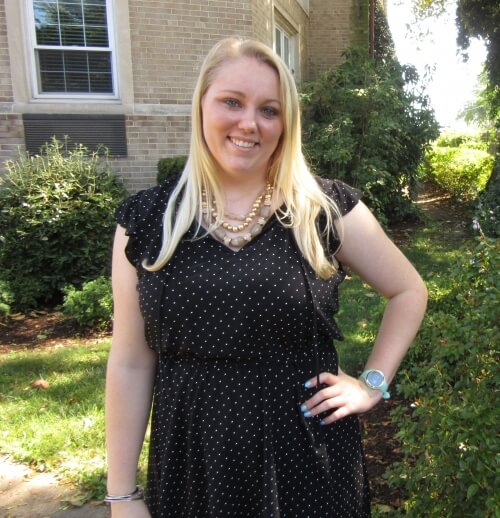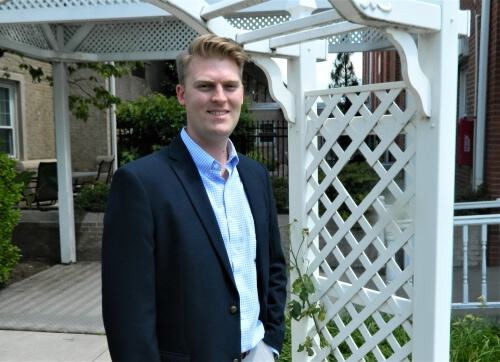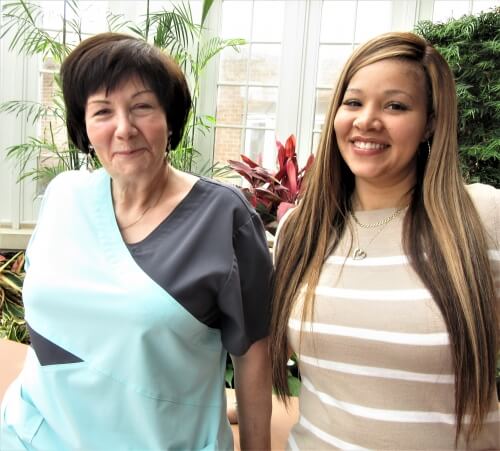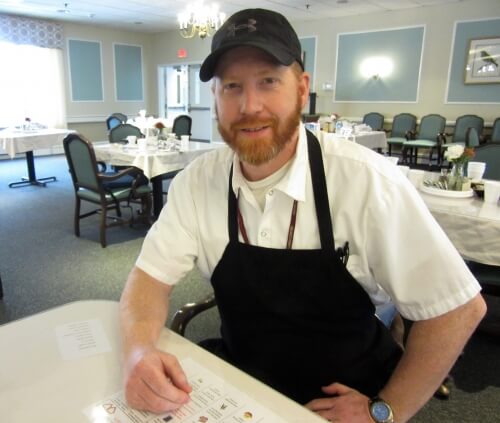Homeland Finance Office: Working behind the scenes to ensure quality care
 At Homeland, there are things that money can’t buy, such as the home-like atmosphere and attention from caring staff.
At Homeland, there are things that money can’t buy, such as the home-like atmosphere and attention from caring staff.
But money can buy little delights, such as lunch for a group of residents at Red Lobster or dipping into Homeland’s charitable funds to pay for an extra that brightens a day, such as an iPad stocked with a resident’s favorite songs.
“It takes a lot of facilitating to make sure there isn’t an interruption of what residents need just because there’s a financial aspect,” says Director of Financial Operations Evelyn Fry. “That shouldn’t be the driving force. The driving goal at Homeland is to make sure that residents get what they need.”
The six-person Finance Office efficiently shoulders many money management duties, so residents, staff, and family don’t have to.
Residents enjoy the office’s impact in big and small ways. When a resident needs a medical service or medication, the Finance Office works with nurses to obtain insurance coverage. If the insurer denies a claim, staffers will track down the problem or, if necessary, allocate payment from Homeland’s Benevolent and Charitable Care fund. In the past year, Homeland Center provided more than $3 million in charitable care.
Circumstances change daily, so the office works closely with Homeland department heads to pin down details and assure accuracy.
Over the years, the office’s functions have changed as regulatory oversight amplified and Homeland grew into today’s continuing care community offering personal, skilled, and dementia care.
“That’s what has kept me here,” says Evelyn, who celebrated her 35th anniversary with Homeland in 2019. “It has always been challenging and interesting.”
“We certainly want our residents to have the things they medically need, or that they need otherwise for their best quality of life,” Evelyn says.
Within the office, it’s all accomplished in an atmosphere of quiet professionalism, good cheer, and adherence to strict confidentiality standards. Each staffer – by coincidence, all women — brings a unique perspective to her role:
• Barbara Jones-White, Administrative Assistant, says the office supports the entire staff so “they can come to work and focus on the care that they give to residents.” She “absolutely loves” interacting with the residents and calls her coworkers “some of the brightest people I have ever met in my life.”
• Sonia Miralda, Administrative Assistant, joined Homeland in September 2019 and loves “the challenge every day.” She ensures residents receive personalized attention: “They come here, and they’re family.’’
• Lori McMichael, Assistant Director of Financial Operations, says she likes the challenge of staying abreast of changes in the industry: “You don’t get bored. You don’t get stagnant.” Lori is also the office decorator, hanging seasonal items such as a Halloween ghost.
• Lucinda Nemet, Accounts Receivable Clerk, has been with the office for 30 years and also helps tending to the birds in the Gathering Room as a way to interact more with residents “We’ve always been a close-knit community and family,” she says. “There are residents you get to know and have relationships with.”
• Cindy Zelko, Assistant Director of Financial Operations, is another long-time employee with 23 years of service. “We’ve been blessed with consistency, so we have the same people knowing what they need to do,” she says. “We’re able to get it right, and we can rely on each other.”
At heart, the office is dedicated to responsible stewardship of Homeland’s financial well-being.
“Whether it’s residents, family, or staff, the Finance Office is here when you need us,” Evelyn says. “We’re very dedicated to making sure that Homeland will exist well into the future.”
Homeland Center’s commitment to charitable, uncompensated care stands as a resource for the community. A nonprofit, 501(c)(3) organization, Homeland relies on the generous support of our friends and neighbors to continue helping the less fortunate. To find out how you can make a difference, call 717-221-7727 or go to www.homelandcenter.org/giving







